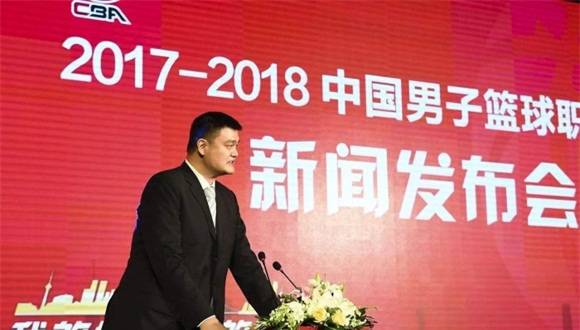In previous years, there might not be CBA games playing during mid-April, when the league had already entered the off-season. Back then, fans complained about the unreasonable schedule of games within a very short time span, while sponsors regretted that they lost many opportunities for logo exposure.
It seems that there was still a long way to go for China’s top basketball league to become both a professional and commercially successful sports league until the new CBA President Yao Ming brought in his new ideas.
Yao was elected as the new CBA Chairman in February 2017. During his first full CBA season in 2018, he believed that China should establish a better operating model by better handling the details in the reform process.
In other words, although some people expected disruptive innovations in Chinese basketball, destroying the original management structure may do more harm than good to Chinese sports culture. Therefore, priority should be given to inheriting and carrying forward the fine traditions of the CBA.
Step-by-step reforms
For the 2017/18 season, the CBA has signed a dozen of broadcast deals with Chinese TV networks led by CCTV 5 as well as two digital media partners, Tencent Sports and zhibo.tv. As title sponsor of the Shanghai Sharks, video sharing website Bilibili holds the rights to stream all CBA games of the team on its platform. In doing so, the CBA enables the younger generation to watch the tournaments via different outlets.
Another eye-catching reform is that the 2018 CBA Playoffs, which started on March 3, was expanded from 8 teams to 10 teams. This means that in the first round, the bottom 4 teams will play a series of “best-of-three set matches” to compete for the 2 positions in the quarterfinals. According to the CBA reform plan, the league is expected to expand to 12 teams in the playoffs next year, meaning that 8 teams will have to play in the first round. The revolutionary schedule change can not only give fans more opportunities and time to watch CBA games, but also make the games more competitive and exciting.
Also, as a response to debatable referee decisions, the CBA Company has started to adopt new strategies, including an appraisal related pay system, the video playback center and referee reports regarding officiating decisions, aiming to establish a more professional referee system for the league.
Two national teams
“Before we choose the road for development, we need to make sure what fits us most and what prerequisites we already have,” Yao said at the start of the year 2018.
Besides professional league operation, youth cultivation and basketball culture, Yao has also made reform measures by forming two national teams, each with an independent coaching staff and roster to represent China at international events through 2018.
In other words, coaches and young players will be encouraged to make more contributions to the professional development of Chinese basketball. It is expected that the two teams will merge for the 2019 FIBA World Cup and the 2020 Tokyo Olympics.
“Making the national team bigger and wider will enable us to see a clearer picture and make better choices,” he said.
Exploiting commercial values
In addition to this, the CBA also included protection of sponsors’ rights and requirements for players’ public comments into its rules, with the goal of reducing or avoiding the side effects caused by potential conflicts on the court.
The CBA divided its sponsorship categories into, Major Sponsor, Strategic Partner, Official Partner, Official Sponsor and Official Supplier, recruiting 18 sponsors and partners in the 2017/18 season.
For example, Yao invited his long-term commercial partner, China Life, to become the league’s first-ever Major Sponsor in a three-year deal. At the same time, the insurance company has also acquired the rights to the kick-off circle signage. The sponsorship deal is reportedly worth CNY350m (USD55.75m).
The sportswear brand Li-Ning signed a five-year extension with CBA for CNY1bn (USD159.16m), along with other brands, including FAW-Volkswagen, Mobil, TCL, UPS and Laoshan Beer. Additionally, another seven companies, Ctrip, China Guangfa Bank, Deppon, Jinmailang Liangbaikai, TAG Heuer, Jeep and Osports, have also been included in the CBA sponsorship portfolio.
Yao said in a Xinhua report that he expected the reforms to pay off by 2019 when China hosts the FIBA World Cup.
Proofread by William Logsdon
